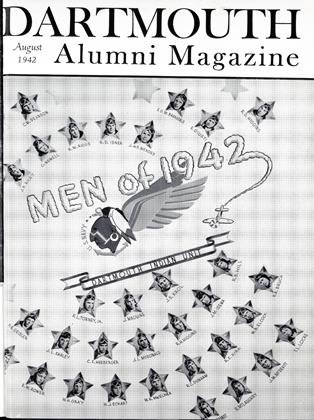THE 1100 UPPERCLASSMEN who returned to Dartmouth for summer studies late in May found waiting for them a new and intensified physical training program, which began with a series of physical ability tests required of all men. The tests, based on the requirements of actual combat duties in the Army and Navy, were also given in improved form to the freshmen who enrolled for the July summer term.
Here is what each student was expected to be able to do: Walk to the top of Balch Hill and back (3 miles) in an hour, swim 50 yards in one minute, float or tread water for five minutes, run 100 yards in 13 seconds, chin six times, climb a 20-foot rope in so seconds, high jump 3 feet 9 inches, broad jump seven feet from a standing position, throw a baseball into a cage 90 feet away twice out of three tries, and kick a football 30 yards.
By the time the freshmen arrived, the baseball throw and football kicking had been eliminated as not significant, and a stiff 440-yard obstacle run had been substituted for the 3-mile walk. It is expected that the tests will continue to be revised and strengthened when repeated for all men at the start of each semester.
Average results among the seniors, juniors and sophomores who took the tests in May included the following, which Prof.
Sidney C. Hazelton '09, director of the program, declared to be "surprisingly good : 50-yard swim, 39.9 seconds; 100-yard dash, 12.7 seconds; chinning, 6.5 times; 20-foot rope climb, 14.8 seconds; standing broad jump, 7.5 feet; and football kick, 37.5 yards. The rope climb proved to be the toughest test, while swimming and walking were the easiest.
Freshmen and sophomores who fell short of any of the physical ability standards were made to follow prescribed training programs for their required "rec," while juniors and seniors were urged to do the same on a voluntary basis.
Dartmouth's wartime physical training program was set up after lengthy studies and discussions by the Committee on Defense Instruction and the Department of Physical Education. It is essentially an intensification of the program which Dartmouth has been following for years, with some special war activities added, and is based on the idea of individual training for each student according to his needs rather than on the idea of mass calisthenics. A thorough physical examination goes along with the ability tests as a preliminary to the prescribed training.
DEATH ENDS CAREER Prof. Harold J. Tobin 'l7, chairman of theDartmouth political science departmetit,who died at Doctor's Hospital, New YorkCity, on June 17, after an extended illnesswhich forced him to take leave from bothhis teaching and his work as head of theAmerican Defense Dartmouth Group. Hisdeath occurred the day before his 48thbirthday. A full account of his distin-guished career will be found in the Necrol-ogy section of this issue.
 View Full Issue
View Full Issue













